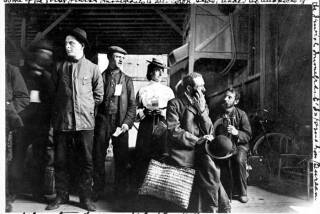Wild beginnings
- Share via
THE enterprise was nearly dead. It was 1608, and the Virginia Company, formed two years before in the hope that America might produce riches enough to replenish King James I’s coffers and even provide a new route to the South Seas, had to face the fact that its Jamestown project was failing. The first settlers, diseased and dying, had turned on one another. Without a working well, they had to drink saltwater, which contributed to fatal illnesses like the vividly named “bloody flux.” Capt. John Smith told London that there was much more work to be done before the company’s dreams could be realized: “[A]s yet,” Smith wrote, in a report that ranks high in the annals of understatement, “you must not look for any profitable returns.”
The more practical thing to “look for” in those early days was survival. But who, aside from the adventurous settlers themselves, was doing the looking? At first, only the small clique of English speculators who, led by Sir Robert Cecil, had formed the Virginia Company in service to the king. There was the usual talk of how important it was to spread the Christian gospel, but Virginia was in fact a closely held commercial undertaking. For Americans of the early 21st century, this view of the Virginia Company, elaborated in Benjamin Woolley’s engaging book “Savage Kingdom” -- one of several new works being published on the settlement’s 400th anniversary -- adds a surprising layer to what is already a necessarily layered understanding of our founding narratives. For a long time, Jamestown has ceded center stage to the Massachusetts Bay Colony and the (allegedly) more humane and pious Pilgrims. Now a popular audience is learning that the roots of the Virginia settlement are more complex than is generally assumed -- which means, in turn, that America’s roots are more complex too.
In Woolley’s telling, it was not King James but his son Henry, Prince of Wales, who proved essential in transforming Virginia from a possible source of revenue for the few to a grand story of Christian zeal and imperial progress for the many. Henry, lost in the mists of history, is in a way an inadvertent founder of what became the United States of America. Smith’s publication of his adventures with Powhatan and Pocahontas (in which the chief’s daughter intervenes to save Smith’s life) created a sensation just as Henry was trying to generate wider public support for English settlement in the New World. “Henry’s interest electrified the debate over Virginia,” Woolley writes. “What had been treated in government circles as a secret commercial venture, confined to an inner elite, took on a much more public, political complexion. Writers, politicians, lawyers and clerics began to talk about Virginia as a national enterprise, a mission to spread civilized Protestant values. These ideas surfaced first furtively in taverns, then erupted thunderously from pulpits and in print.”
The idea of Jamestown as a religious adventure linked to a larger drama is also spelled out in Karen Ordahl Kupperman’s “The Jamestown Project.” In her view, the Virginia enterprise stemmed in part from the Christian belief that the world had entered the last days before the apocalyptic unfolding of events described in the Bible, in the books of Daniel and Revelation, and that “part of the divine plan’s culmination was preaching the Gospel to the whole world.”
The strength of both of these Jamestown histories lies in how they chart the intellectual, cultural and political landscape in Europe, the Mediterranean and other parts of the Americas that produced, a decade or so before Plymouth, what became the first permanent English settlement on this side of the Atlantic. What Kupperman and Woolley make clear is that Jamestown should be seen not simply as prologue to Massachusetts Bay -- though prologue it was, for good and for ill -- but also as an element of a much larger brew of global political, religious and economic forces. Many times in our history we have been told, in the words of John Donne (who once preached a sermon in support of the missionary work of the Virginia enterprise), that no man and no nation is an island. In the twilight of World War II, Franklin Roosevelt argued that we could no longer remain isolated behind our shores. A lesson of Jamestown is that it was ever thus: America arose out of global conflict and global ambition, as empires driven alike by God and Mammon sought to dominate one another. From the beginning, the Virginia settlement was the product of clashes between several different civilizations: the Ottomans versus the Spanish, the Spanish versus the English, the settlers versus the Native Americans.
Woolley might be said to be the Jerry Bruckheimer of the two authors: His is a swashbuckling saga of political maneuvering, storms at sea, hostile indigenes, violence and starvation. A broadcaster and writer who lives in London, he is fond of the cinematic image, and his book is sprightly and vivid. He also draws interestingly on Spanish diplomatic records, using the papers of Madrid’s envoy to London to show the Catholic empire’s anxiety about what Protestant England was up to in the New World. It was, after all, the Spanish who in 1565 established the first successful North American colony, Florida’s St. Augustine.
Pursuing an imperial vision in the middle years of the Jamestown settlement, the British felt they were locked in a mortal struggle, a struggle Prince Henry had helped define. Woolley notes that the young man’s death in 1612 was an occasion of enormous public grief: “The outpouring of literature prompted by Henry’s death far exceeded that for Queen Elizabeth.” In Virginia, Sir Thomas Dale, deputy governor of the Virginia Colony, said that Henry “was the great captain of our Israel, the hope to have builded up this heavenly New Jerusalem.” Tactically, the Spanish feared that Jamestown was to be an outpost for English piracy; strategically, control of the New World could alter the balance of power between Protestant and Catholic Europe.
If Woolley is Bruckheimer, then Kupperman, a historian at New York University, is Merchant and Ivory, providing an elegant, intellectually richer account. Beyond the global context, Kupperman makes a compelling case that Jamestown succeeded only after a kind of democracy began to develop there. Purely commercial operations, controlled by companies from afar, could not inspire and sustain the kind of commitment that transatlantic settlement required. As Shakespeare wrote in “The Tempest” (thought to be inspired by the story of a ship that was wrecked en route to Jamestown), there was a “brave new world” at hand -- a world that, to be sure, had a lot of faults in common with the old but which offered thrilling prospects to those with the wherewithal to make a go of it. After 1618, the Jamestown model of New World colonization, with its emphasis on sending largely all-male contingents in search of a quick payoff, shifted slightly. Citing Capt. Smith, Kupperman concludes that “the sum of all experience ... was that colonization succeeded only where each family had a stake in the outcome and where merchants rather than aristocrats did the planning.” Patience, common sense and a strong appreciation of local culture and mores were essential. Jamestown learned these lessons at great pain and expense, but successive settlements drew on this wisdom as they moved forward.
Like our other founding myths, the story of Jamestown has its highs and lows: moments of admirable human courage and instances of gruesome violence and injustice, chiefly at the expense of the Native Americans whom the Europeans were beginning to displace. Religion, commerce and power were inextricably bound up in the founding of the colony, which is fitting, for religion, commerce and power are perennial themes in the American saga. We began as we have gone on -- alternately in communion and in conflict. *
More to Read
Sign up for our Book Club newsletter
Get the latest news, events and more from the Los Angeles Times Book Club, and help us get L.A. reading and talking.
You may occasionally receive promotional content from the Los Angeles Times.










